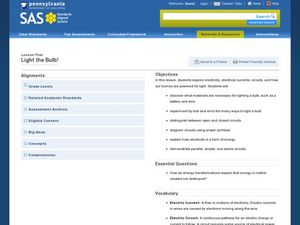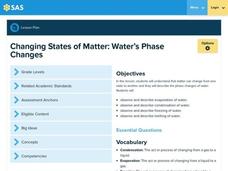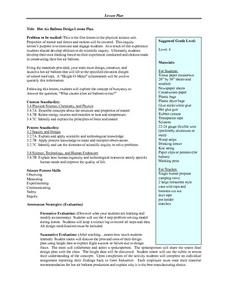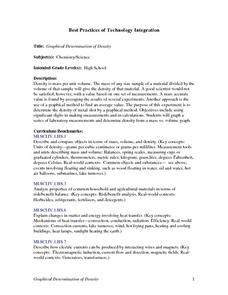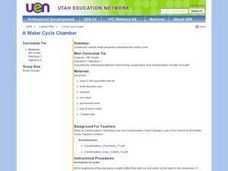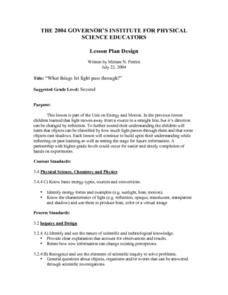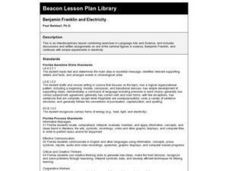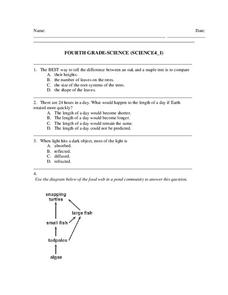Curated OER
How Oceans Affect Climate
Learners draw conclusions about how the ocean affects temperature. In this weather lesson, students use the Internet to gather data to help them come to a conclusion about how the climate in a certain region is directly affected by the...
Pennsylvania Department of Education
Light the Bulb!
Third graders investigate electrical circuits and how light bulbs are powered. In this electricity and power lesson, 3rd graders study the vocabulary necessary which includes the different types of circuits, electrical currents, and...
Pennsylvania Department of Education
Changing States of Matter: Water’s Phase Changes
Third graders observe the properties of water and in its different states. In this states of matter lesson, 3rd graders view a video, read The Magic School Bus at the Waterworks and experiment with freezing, melting and boiling water to...
Curated OER
Newton's Laws
Students identify Sir Isaac Newton and his contribution to physics. They write Newton's three Laws of classical mechanics. and apply Newton's Laws to the world around them. They isolate a situation and apply Newton's Laws.
Curated OER
Hot Air Balloon Design Lesson Plan
Sixth graders discuss what they know and what they want to know about hot air balloon using a KWL chart. They then use a wide array of materials to design a hot air balloon that will lift successfully in cooperative groups referring to...
Curated OER
PICTURE PERFECT PYRAMID
Students create a model of the USDA's Food Pyramid Guide, using shoe boxes. They bring an assortment of shoe boxes from home. Students are given a copy of the "Food Guide Pyramid." They wrap boxes for the bread group in white, the...
Curated OER
Building a Terrarium System
Students create their own terrariums. In this ecological model lesson, students create terrariums using soil, seeds, pebbles, and two liter bottles. Students compare the elements of a terrarium to a food web.
Curated OER
Sea Surface Temperature Trends of the Gulf Stream
Pupils use authentic satellite data to produce plots and graphs of sea surface temperature as they explore the seasonal changes of the Gulf Stream.
Curated OER
Sea Surface Temperature Trends of the Gulf Stream
Students explore the importance of the Gulf Stream. Using a NASA satellite images, they examine the sea surface temperature. Students collect the temperature at various locations and times. Using spreadsheet technology, they graph the...
Curated OER
Graphical Determination of Density
Students determine the density of metal shot by a graphical method using significant digits in making measurements and calculations. Students graph a seris of laboratory measurements and determine density from a mass verses volume graph.
Curated OER
Melting, Freezing, and More!: Phase Transitions
Third graders listen to a talk on phase transitions and view three demonstrations. In this phases of matter instructional activity, 3rd graders complete a worksheet as they listen about phase transitions. They move through three...
Curated OER
A Water Cycle Chamber
Fourth graders are shown the water cycle by watching a demonstration by their teacher. In groups, they are given one two-liter bottle with a starter hole and follow instructions to complete the set up. They place ice cubes into the...
Curated OER
Demonstration of Factors Affecting Soil Temperature
Young scholars examine the influences of water and mulch on soil temperature. In this investigative activity students complete a soil experiment.
Curated OER
Review For Weather Quiz 2
In this science worksheet, students look at the information carefully in preparation for a formal assessment. The focus is upon defining different aspects of air masses.
Curated OER
What things let Light Pass Through?
Second graders classify objects according to how well light can pass through them and predict how well objects will transmit light. They experiment with objects to verify predictions while collecting, recording, and interpreting data...
Curated OER
Describing an Object's Position
Students explore language arts by participating in a shape identification activity. In this geometry shape lesson, students discuss the vocabulary terms used to describe the location of an object. Students complete a worksheet based upon...
Curated OER
Properties of Ionic Compounds
For this compounds worksheet, students describe why metals and nonmetals form ionic compounds and why the formation of ionic compounds are exothermic. This worksheet has 5 short answer questions.
Alabama Learning Exchange
How Are Rainbows Created?
Students describe how the sun's rays produce colors. They describe how water causes the sun's rays of light to bend, producing a rainbow.
Curated OER
Temperature and Enzymes
Students compare the times it takes the milk in each of two cups to curdle. They are told that an enzyme that is added to the milk, rennin, is involved in the natural curdling process of milk. Students are asked to consider what...
Curated OER
Sound Box
Students make simple observations and identify relevant variables, such as frequency and diameter. They then discuss the relationship between variables. The task assesses students' abilities to make simple observations and make...
Curated OER
Benjamin Franklin and Electricity
Second graders study Benjamin Franklin and participate in simple experiments in electricity.
Curated OER
Meteorology Madness
Students probe the dynamic weather changes through several hands-0n activities in this seven lessons unit. The hydrologic cycle, clouds, atmosphere, air movement, fronts, and forecasting form the components presented in this unit.
Curated OER
Identifying Clouds
Students work in groups to research and prepare a report on cloud types. They present their findings to the class and take a group quiz competing for points. Students go outside and determine which type of clouds are visible on that day.
Curated OER
Fourth Grade Science
In this science worksheet, 4th graders complete multiple choice questions about day lengths, light and dark, food, recycling, and more. Students complete 25 questions.



